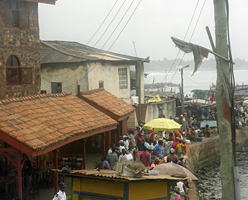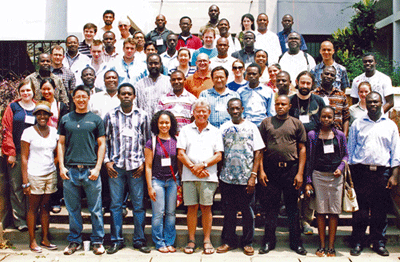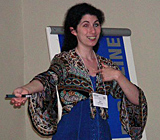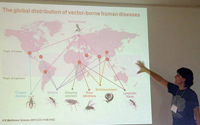Fefferman Co-organizes Genetics & Disease Workshop in Ghana
 In August 2011, Dr. Nina Fefferman co-organized a Workshop on Genetics and Disease Control in Elmina, Ghana (pictured left; participants below). The workshop emphasized the genetics of pathogens, hosts, and vectors, and featured Rutgers professors Dr. Siobain Duffy and Dr. Dina Fonseca. Genetic perspectives contribute to a variety of factors already included in many epidemiological models: the effects of climate, ecology, human population densities, infectivity, vector life cycle, and many others. Incorporating genetic effects into predictive epidemiological models and determining the risks and benefits from genetic engineering require sophisticated mathematical approaches.
In August 2011, Dr. Nina Fefferman co-organized a Workshop on Genetics and Disease Control in Elmina, Ghana (pictured left; participants below). The workshop emphasized the genetics of pathogens, hosts, and vectors, and featured Rutgers professors Dr. Siobain Duffy and Dr. Dina Fonseca. Genetic perspectives contribute to a variety of factors already included in many epidemiological models: the effects of climate, ecology, human population densities, infectivity, vector life cycle, and many others. Incorporating genetic effects into predictive epidemiological models and determining the risks and benefits from genetic engineering require sophisticated mathematical approaches.
 The workshop was part of a series of US-African BioMathematics Initiative workshops that identify key bio-mathematical challenges, create partnerships between US and African scientists, and train junior researchers to work in the field of biomathematics. The Initiative fosters creative applications of mathematical techniques to study the constraints of various biological systems and identify strategies for intervention or control that would be maximally effective. Previous workshops have focused on wildlife conservation, economic epidemiology, and landscape ecology and environmental sustainability will be featured next year. Africa, as the focal continent of this initiative, provides a diverse and unique set of socio-economic, political, ecological, and public health concerns, therefore providing a unique opportunity for mathematical modeling to design or enhance strategies for disease control. While the limited financial resources of the developing world provide a specific need for
The workshop was part of a series of US-African BioMathematics Initiative workshops that identify key bio-mathematical challenges, create partnerships between US and African scientists, and train junior researchers to work in the field of biomathematics. The Initiative fosters creative applications of mathematical techniques to study the constraints of various biological systems and identify strategies for intervention or control that would be maximally effective. Previous workshops have focused on wildlife conservation, economic epidemiology, and landscape ecology and environmental sustainability will be featured next year. Africa, as the focal continent of this initiative, provides a diverse and unique set of socio-economic, political, ecological, and public health concerns, therefore providing a unique opportunity for mathematical modeling to design or enhance strategies for disease control. While the limited financial resources of the developing world provide a specific need for  maximally efficient solutions to these kinds of problems, the approaches and solutions developed by the Initiative have implications worldwide.
maximally efficient solutions to these kinds of problems, the approaches and solutions developed by the Initiative have implications worldwide.
Drs. Nina Fefferman, Siobain Duffy, and Dina Fonseca, all SEBS faculty, led workshops in their particular areas of expertise. Fefferman, left, specializes in applying mathematical models to biological systems. She led two graduate student tutorials, Epidemiological Models, and Population Genetics, Genes, and Information. She also participated in a panel discussion on the future of mathematical biology/mathematics in Africa. These workshops incorporated predictive epidemiological models into Africa's particularly challenging issue of disease control.
 Duffy, right, specializes in the evolution of emerging viruses and bioinformatics; she was, therefore, the natural choice to give the graduate student tutorial on Viral Evolution. She also led a workshop titled Emergent Single-Stranded Viruses Evolve as Quickly as RNA Viruses.
Duffy, right, specializes in the evolution of emerging viruses and bioinformatics; she was, therefore, the natural choice to give the graduate student tutorial on Viral Evolution. She also led a workshop titled Emergent Single-Stranded Viruses Evolve as Quickly as RNA Viruses.
 Fonseca, pictured at left in Ghana, specializes in infectious diseases, evolutionary ecology, and mosquito control. In Ghana, she led a graduate student tutorial on Techniques for Analyzing "Important to Disease" Genetic Traits in Vectors. She also led a workshop on utilizing genetics for risk analysis in vector borne diseases.
Fonseca, pictured at left in Ghana, specializes in infectious diseases, evolutionary ecology, and mosquito control. In Ghana, she led a graduate student tutorial on Techniques for Analyzing "Important to Disease" Genetic Traits in Vectors. She also led a workshop on utilizing genetics for risk analysis in vector borne diseases.
The workshops are jointly sponsored by the Center for Discrete Mathematics and Theoretical Computer Science (DIMACS) at Rutgers, the Mathematical Biosciences Institute (MBI) at Ohio State University, The Society for Mathematical Biology (SMB), and The US National Science Foundation (NSF).


